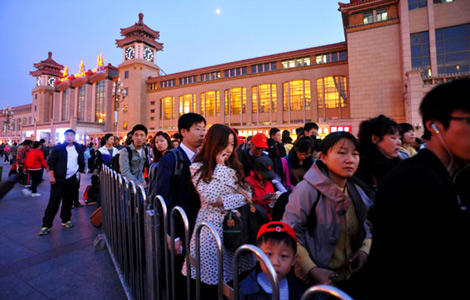China on course to squeeze property bubble
Updated: 2011-10-05 10:15
(Xinhua)
|
|||||||||||
BEIJING - After nearly two years of government efforts to cool the country's rampant property market, prospective homeowners are finding that housing prices may fall within their reach before long.
Home sales are drying up in many cities. Property developers are feeling strain from the credit crunch and higher borrowing costs. Analysts said real estate firms may be forced to cut prices due to the government's firm grip on the market, which has included purchase limits in cities and reduced liquidity.
Other measures put in place include higher down payments, the introduction of a property tax in some cities and the construction of low-income housing projects.
Signs of progress
In the first half of September, contract sales for new homes in Beijing stood at 2,056 units, down 16 percent from the first half of August and down 33 percent from the second half of the month, according to figures from Basic-5i5j, a major real estate sales and consulting firm based in Beijing.
Sales of new homes and existing homes fell 26.4 percent month-on-month to reach about 13,000 units in August, the lowest amount sold since 2009, according to a Beijing-based real estate transaction management website.
New home prices slid 2.5 percent from July and second-hand homes edged down 0.9 percent in August. Shanghai and Shenzhen also suffered sluggish housing sales.
Hurt by the gloomy sales, property prices in other cities have started to drop after defying government controls for months on end.
The latest figures from the National Bureau of Statistics showed that 46 cities out of a statistical pool of 70 major cities saw new home prices decline or remain unchanged from a month earlier in August, compared with 31 cities in July. Sixteen cities saw month-on-month decreases in new home prices in August, up from 14 in July.
"The reason why housing prices are so difficult to tame is because of the record lending boom that occurred in previous years, local governments' reliance on land sales for revenue and the expectation that housing prices will always continue to rise," said Yin Zhongli, a property and financial expert from the Chinese Academy of Social Sciences, a government think tank.
To drain excessive money out of the market, the People's Bank of China, the country's central bank, has raised its reserve requirement ratio for banks 12 times and hiked interest rates five times since the beginning of last year.
China's property developers will face increasing liquidity pressure over the next six to 12 months, with tightening credit conditions possibly resulting in decreased prices, US-based financial services company Standard and Poor's said on last week.
"The recent figures indicate that the government's measures are having a gradual impact," said Wang Pei, a property analyst from CEBM Group Ltd., an independent investment advisory firm. He said that he expects average housing prices across the country to decline starting from September, with property investment slowing down during the period as well.
Outlook is positive
"The government is combining short-term controls used to mop up liquidity and medium-term measures that will provide low-income housing to remove the factors that contribute to high prices," Wang said.
Price declines will be more evident in 2013 after more low-income homes go on the market, Wang said.
China announced earlier this year that it will build 36 million low-income housing units by 2015, of which 10 million will be constructed this year.
The government is hoping that the projects, which will account for 20 percent of the country's housing market by 2015, will help the housing market develop in a more healthy fashion.
In the first eight months of this year, local governments across China started building or renovating 8.68 million government-subsidized housing units.
Chen Guoqiang, vice chairman of the China Real Estate Society, said China sold nearly 9 million apartments last year, a record high since China reformed its property market in 1998, but smaller than the number of low-income homes that will be constructed this year and next year.
The continuous supply of low-income homes on such a large scale will significantly change the market's structure and greatly ease supply shortages, Chen said.
Government maintains grip
Despite slower home sales, the government has no intention of relaxing its grip on the market, as the overheated property sector only showed tentative signs of cooling after a series of heavy-handed tightening measures were put into place.
Premier Wen Jiabao stated in an article published earlier last month that China still faces relatively large pressure from housing price increases in both the short- and long-term, and prices in most cities remain at high levels.
It will take more time for the government's measures to demonstrate their full impact, he said, urging the resolute implementation of the regulatory policies to ensure their effectiveness.
Wang said China's measures to control the property market are at a critical stage and should not be loosened, as policy changes could skew the public's expectations regarding housing prices.
Yin suggested that the government should keep its prudent monetary policies and create policies that would allow the free trade of non-arable rural land.
Administrative intervention will prove to be the most effective tool in stabilizing the property market if institutional factors that keep prices high can't be eliminated, he said.
"In order to rein in skyrocketing housing prices, the government has no other choice but to impose purchase limits and increase the available number of low-income homes," he said.
Hot Topics
Libya conflict, Gaddafi, Oil spill, Palace Museum scandal, Inflation, Japan's new PM, Trapped miners, Mooncake tax, Weekly photos, Hurricane Irene
Editor's Picks

|

|

|

|

|

|






